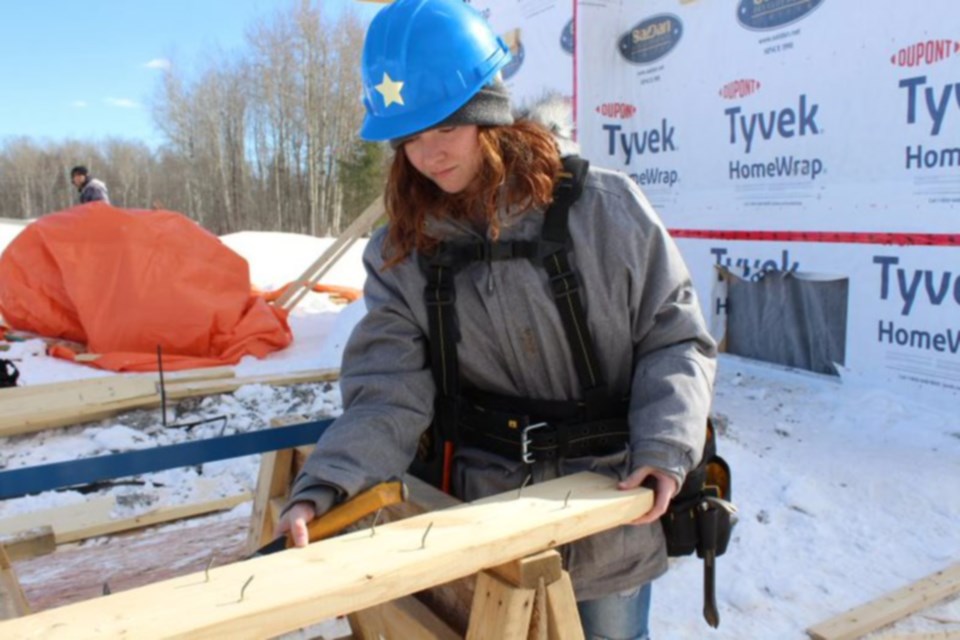More females are working in skilled trades these days filling a need for the special talents they bring to the workforce moving forward.
“Women are more attentive (in the skilled trades, as well as all professions). I feel women bring a lot to the table that we don’t see enough of. It leads to a more diverse group of people which in the end is only going to strengthen a company. You’re going to end up with a better quality finished product,” said Holly Tennant, Sal-Dan Developments' communications coordinator, speaking to SooToday on March 9.
March 6 to March 13 marks Women In Construction Week (WICW).
Chelsee Bye, Sal-Dan Developments' health and safety coordinator, has seen it all and done it all since she first picked up shop tools.
Bye graduated from White Pines Collegiate and Vocational School and always enjoyed working with her hands. She studied technical subjects while at high school and has been a key Sal-Dan Developments employee for the last seven years.
“In Grade 10, I started in woodworking, then I did welding. I’ve done a bit of everything. I did insulation, landscaping and other general labourer tasks,” Bye said.
Her initial experience in the skilled trades opened management doors, leading to work at the Sal-Dan office on Great Northern Rd. after studying health and safety training at Sault College.
With Sal-Dan, Bye has worked in accounting and has trained construction crews in Sudbury and at southern Ontario work sites.
“It’s been nice to see the whole aspect of the company, to see how a construction company runs and what it all entails on job sites in a hands-on way and in an administrative way,” Bye said.
Though Bye said both women and men should be prepared for physically demanding work in the skilled trades, she emphasized, “I would definitely encourage women (to get involved in skilled trades). Absolutely. It’s financially rewarding. There’s also the independence aspect. Before I was in housebuilding, I probably would've gotten somebody else to do it. Now I’ve got the confidence to pick up a saw and a hammer.”
Shea MacGillivray — a Superior Heights Collegiate graduate and former ADSB House Building Project student — is now a SalDan construction site supervisor. She says the attitude towards females in skilled trades is changing.
“We continue to see young women enrol and try out the House Building Program through ADSB, which has been great. I also have noticed that going into the trades and going through with apprenticeships is a more common topic nowadays.”
MacGillivray has some straightforward advice for any female high school student or older females interested in retraining.
“If you are interested and motivated to join the trades, do it.”
“You are more than capable. Even if the trades end up not being something that you want to take on as a career, it can equip you with amazing skills. You learn a lot of practical information and techniques. Be confident and if you make a mistake, keep trying and ask lots of questions.”
MacGillivray is an avid supporter of Women In Construction Week.
“I believe that it’s important to recognize that construction can be for many different people. It’s a stigma that the trades are for men and that women are not capable of the same things. Throughout history, construction has been deemed a man’s world. Nowadays, I believe that society is doing a better job at shedding light on the fact that your gender does not dictate what you are capable of.”
“Algoma District School Board is pleased to support Women In Construction Week as it is one way to highlight our female students who have found their passion in construction and the skilled trades,” said Lucia Reece, ADSB director of education in a release.
In Algoma, a big shortage of skilled trades workers is anticipated.
Across Ontario, an estimated 83,000 workers will be needed in the trades.
Parents and students are being encouraged by the ADSB to reach out to their school’s guidance department or co-op teacher to learn more about co-op, Ontario Youth Apprenticeship Program (OYAP) and House Building programs which give students a chance to try out a career while still in school.
Statistics gathered and shared by The Holmes Group (THG) show that overall, 13 per cent of Canadians employed in the construction industry (both on and off-site) are women.
While that figure seems low, Canada compares well with other nations when it comes to women employed in construction. By contrast, in the U.S., the number is closer to nine per cent while it sits at 10 per cent in the United Kingdom.
— SooToday




